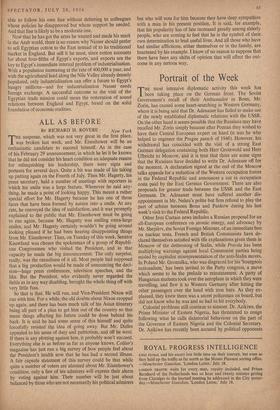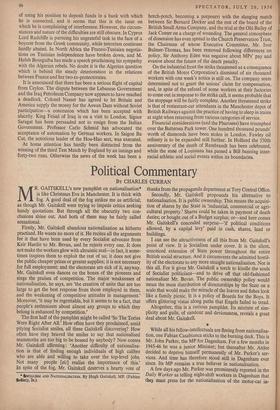Portrait of the Week
of using his position to deposit funds in a bank with which he is connected, and it seems that this is the issue on which he is complaining of interference. However, the circum- stances and nature of the difficulties are still obscure. In Cyprus Lord Radcliffe is pursuing his ungrateful task in the face of a boycott from the Greek community, while terrorism continues hardly abated. In North Africa the Franco-Tunisian negotia- tions on Tunisian independence have broken down, and M. Habib Bourguiba has made a speech proclaiming his sympathy with the Algerian rebels. No doubt it is the Algerian question which is behind the steady deterioration in the relations between France and her two ex-protectorates.
It is announced that there has been a serious flight of capital from Ceylon. The dispute between the Lebanese Government and the Iraq Petroleum Company now appears to have reached a deadlock. Colonel Nasser has agreed to let Britain and America supply the money for the Aswan Dam without Soviet participation—a concession which has been accepted with alacrity. King Feisal of Iraq is on a visit to London. Signor Saragat has been persuaded not to resign from the Italian Government. Professor Carlo Schmid has advocated the acceptance of automation by German workers. In Saigon Ba Cut, the notorious leader of the Hoa-Hao sect, was executed.
At home attention has hardly been distracted from the winning of the third Test Match by England by an innings and forty-two runs. Otherwise the news of the week has been a hotch-potch, becoming a potpourri with the slanging match between Sir Bernard Docker and the rest of the board of the British Small Arms Company, and the trial at the Old Bailey of Jack Corner on a charge of wounding. The general atmosphere of dissension has even spread to the Church Preservation Trust, the Chairman of whose Executive Committee, Mr. Ivor Bulmer-Thomas, has been removed following differences on policy. Sir Anthony Eden was negative about MPs' pay and evasive about the future of the death penalty.
On the industrial front the strike threatened as a consequence of the British Motor Corporation's dismissal of six thousand workers with one week's notice is still on. The company seem determined not to grant the unions' claim for compensation, and, in spite of the refusal of some workers at their factories to come out in response to the strike call, it seems probable that the stoppage will be fairly complete. Another threatened strike is that of restaurant-car attendants in the Manchester depot of British Railways against the practice of having to sleep in trains at night when returning from various categories of service.
Financial considerations (and the Pharisees)'have triumphed over the Battersea Park tower. One hundred thousand pounds' worth of diamonds have been stolen in London. Fawley oil refinery is to be expanded still further. In Holland the 350th anniversary of the death of Rembrandt has been celebrated. while the state of Louisiana has passed a Bill banning inter- racial athletic and social events within its boundaries.



















































 Previous page
Previous page